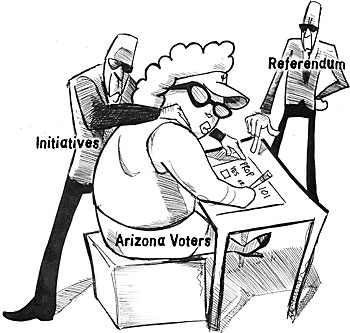
Illustration by Cody Angell
|
By Jason Baran
Arizona Daily Wildcat
Monday October 14, 2002
Arizona's Constitution violates the central tenet of American governance that protects the citizenry from mob rule.
That fundamental protection is the republican form of government. It is guaranteed by the supreme law of the land as a protection against short-sighted, destabilizing swings in the moods of the populus.
The republican government embodied by representational democracy is as much a buffer against tyranny as the separation of powers among the various branches of government. The framers intended the separation of powers as a check to surges in political sentiment. By dividing power and creating a system of contention and conflict, the framers assured that individual liberties would be protected.
No ephemeral majority would ever be able to permanently endanger the system that so carefully protects liberty and opportunity.
The initiative and referendum process in Arizona disdainfully laughs at the constitution as it shatters the citizens' protection against a whim. The process by which "citizen legislators" put forth permanent changes to the state's constitution strips away the systemic protections so diligently constructed by the founders.
The principle of representation creates a situation in which conflicting desires can be slowly and safely resolved. The situation is the Legislature. Problematic issues must be addressed in the Legislature, where Arizonans' interests can be represented. The Legislature allows decision makers to be educated by lobbyists on all sides of the issue. That's right, lobbyists ÷ despite the pejorative use of the word in the popular lexicon÷ play a central role in the development of reasonable policy. Competing interests square off and the result ÷ if a solution can be found÷ is less drastic and ultimately less dangerous.
The proponents of initiatives argue that this system is more democratic and puts responsibility back in the hands of individuals ÷ both good things, particularly the latter. But this is sadly not inaccurate. Democracy and responsibility require a certain degree of education and understanding about the consequences of a vote. These may be lacking in the Legislature, but they are non-existent in the general public.
Most people are apathetic to the issues because they don't know the details of the substantive ones. What are the consequences of Prop. 101? For that matter, what is Prop. 101?
Don't know? You're not alone, yet its fate and the impact on Arizona are left to uniformed and apathetic voters.
What are the substantive differences among the gaming initiatives? What will happen if one or all three pass? The three have been advertised as if it's a matter of three choices. That's not true.
Voters have a fourth choice they often don't realize they have ÷ none of the above. Supporters of these initiatives don't want you to know that.
The thing that really makes initiatives dangerous is their permanence. They can't be adjusted by the Legislature to remedy errors or correct for really damaging language.
The text as originally proposed is the text that gets enacted into law.
The people of the state get stuck with a lemon because they didn't know what they approved. At least measures in the Legislature can be amended or withdrawn by new legislation.
Moreover, voters can voice dissatisfaction with newly enacted, poorly constructed laws by voting their representatives out of office. What sanction is there for citizen legislators? They can't be voted out of office.
The referendum ÷ referral of legislation to the voters by the legislature ÷ is similarly disturbing. It is simply a way for the Legislature to avoid tough decisions.
If the legislators don't have the courage to vote for ÷ or against ÷ a measure, they can force the unsuspecting, uninformed voters to make final call. Representatives are elected to make the tough calls because the individuals don't have the time and resources to research and contemplate issues. They have work to do and families to raise.
Naturally, they don't spend much time thinking about initiatives and referendems; so they become the prey of commercials that claim a proposition will fix the budget crisis, alleviate the pain of the terminally ill, put child molesters behind bars or make a segment of the community self-reliant.
All are agreeable ends for society, but at what cost?
Initiatives leave Arizonans vulnerable and Madison spinning in his grave.

